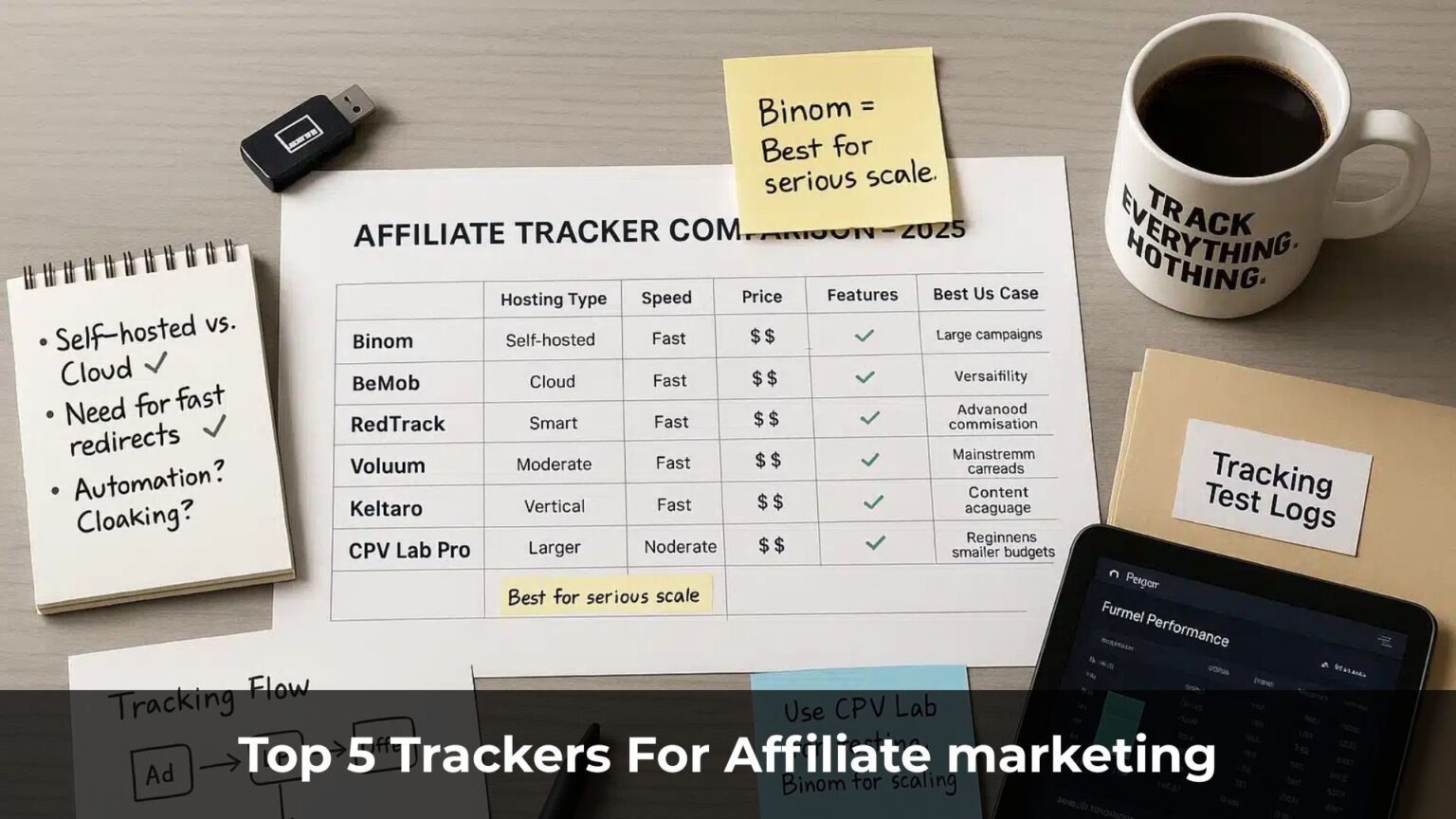Affiliate marketing is one of the most popular ways to make money online today.
You don’t need to create a product. You don’t have to handle fulfillment. And you don’t need a huge upfront investment. In theory, all you need is a link—and a good promotional strategy.
But what about reality?
Many people try affiliate marketing for a few months and then quit. Some say, “The competition is too fierce.” Others complain, “I lost money on ads.” Some even say, “I spent $999 on multiple courses and still haven’t made a single dollar.”
So, why is affiliate marketing so hard?
This article won’t sugarcoat anything—and it’s not here to scare you either.
My goal is simply to take an honest look at the challenges, so you can understand what affiliate marketing really involves—and more importantly, decide whether this path is worth pursuing.
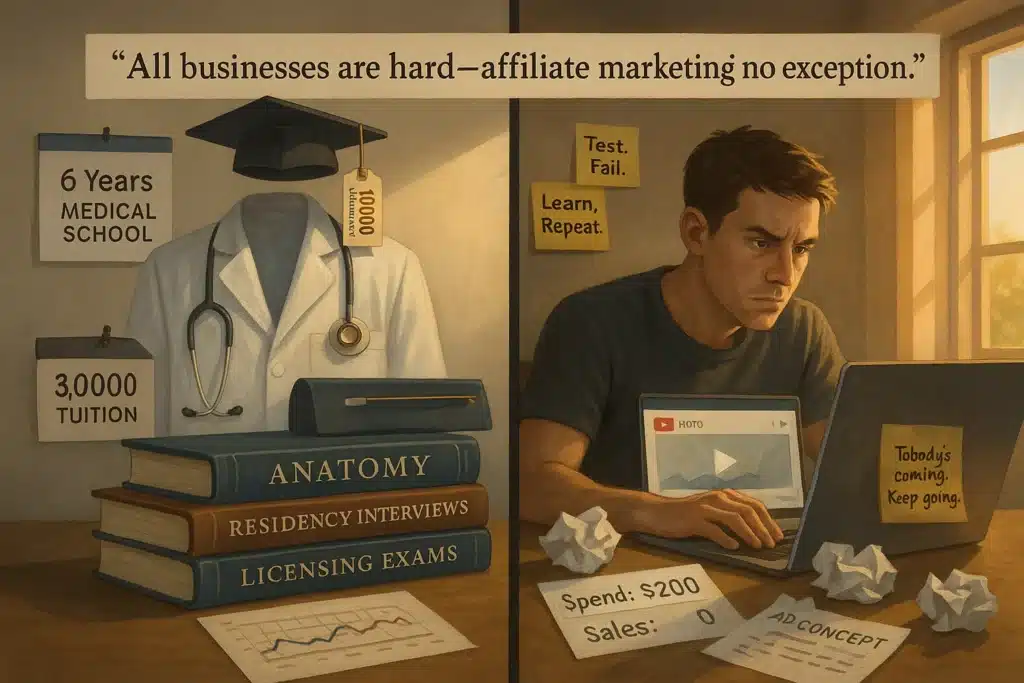
Table of Contents
ToggleAll Businesses Are Hard—Affiliate Marketing Is No Exception
Want to become a doctor? That takes six years of study.
Want to be an accountant? You’ll need at least four years of university, followed by internships, low-paying jobs, and ongoing certifications before you can make a decent living.
But when it comes to affiliate marketing, many people expect to make money within just a few weeks.
They watch a couple of tutorial videos, sign up for an affiliate network, and launch an ad campaign.
Then, after spending $200 on ads without making any sales, they decide: “Affiliate marketing is too hard. Maybe this isn’t for me.”
But here’s the truth: that experience is completely normal.Because affiliate marketing—despite being online—is still a business.
And like any business model, it comes with its own set of challenges.
The biggest difference?
- You have to learn by doing, often with no one guiding you.
- There’s no degree or certificate to validate your progress.
- No one checks your work—but no one takes responsibility when you fail either.
Affiliate marketing isn’t harder than other fields. It’s just different—in how you learn and what you expect.
If you approach it with the same discipline and persistence you’d use to earn a university degree, affiliate marketing can absolutely be a path worth pursuing.
How Hard Is Affiliate Marketing Compared to Other Online Business Models?
Many people say affiliate marketing is “hard.” But the real question is: hard compared to what?
If you’re comparing it to winning the lottery or making money by casually scrolling Facebook for a few hours a day—then yes, affiliate marketing is hard.
But when compared fairly to other popular online business models, affiliate marketing is actually one of the most accessible paths.
Affiliate Marketing vs. Dropshipping
Dropshipping is a business model where you sell products without keeping inventory.
When a customer places an order, you forward it to a supplier—usually based in China—who ships it directly to the customer.
Sounds simple? In reality, it’s far more complicated:
- You’re still responsible for customer service—handling complaints, refund requests, delays, and defective items.
- Long shipping times often lead to angry customers.
- You need to build a website, create sales funnels, optimize for conversions, and run ads—just like a real eCommerce brand.
- Many products are trend-based and can lose traction quickly—or worse, get banned from advertising platforms like Facebook.
- You risk having your funds held by platforms like PayPal or Stripe. And in many cases, you need to register an LLC to even use Stripe.
Affiliate marketing doesn’t come with those headaches.
You’re promoting products that already exist on the market. You’re not responsible for operations—and if no one buys, you don’t lose money on fulfillment or customer service.
Your profit per sale may be lower, but your risk is also significantly reduced.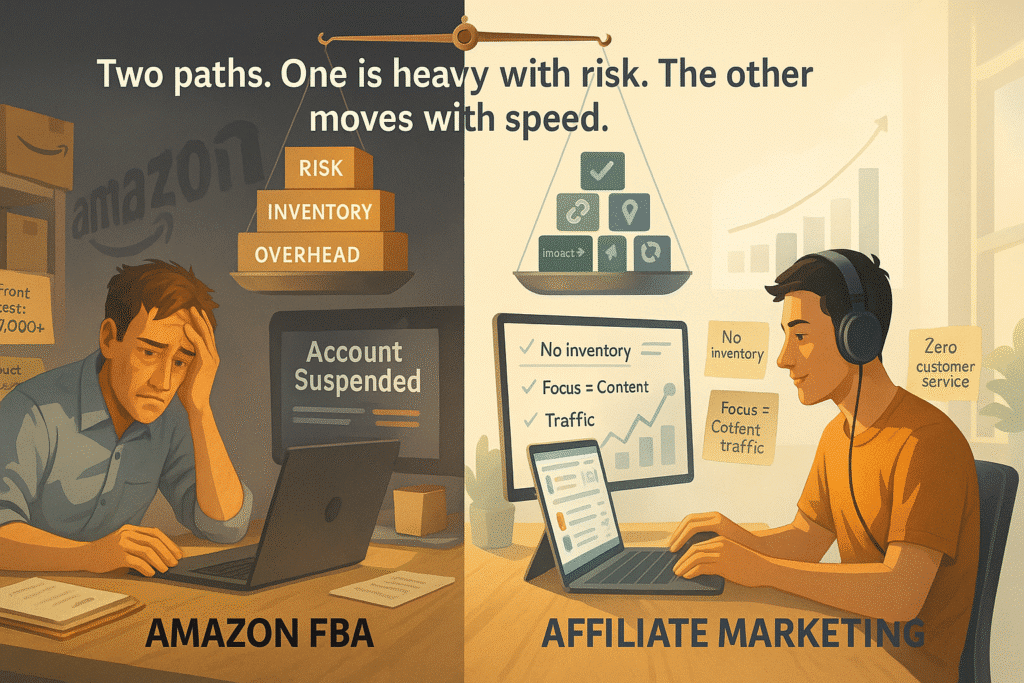
Affiliate Marketing vs. Amazon FBA
Amazon FBA (Fulfillment by Amazon) is a business model where you purchase inventory in bulk from suppliers, send it to Amazon’s warehouses, and let Amazon handle fulfillment, shipping, and customer service.
Sounds hands-off, right? In reality, it’s far from stress-free:
- You need significant upfront capital—often several thousand dollars just to get started.
- If the product doesn’t sell, you’re stuck with unsold inventory.
- The competition is intense. Black-hat tactics and fake reviews are common.
- You’re entirely at the mercy of Amazon. One account suspension or policy change can wipe out your entire business overnight.
Affiliate marketing is the opposite: You don’t need to buy inventory. You don’t deal with orders or customer complaints.
Your sole focus is creating content or running campaigns to drive sales—everything else is handled by someone else.
Affiliate Marketing vs. Freelancing
Another popular way to make money online is by offering services—writing content, designing, coding, translating, running ads, doing SEO, and more.
In this model, you trade your personal skills for income.
Advantages:
- You can start quickly if you already have the skills.
- You can earn steady income—either hourly or per project.
- There are plenty of platforms to help you find clients, such as Fiverr, Upwork, and Freelancer.
But freelancing comes with limitations.
Your income is directly tied to your time—if you stop working, the money stops too. It’s difficult to scale because, at the end of the day, you’re still trading hours for dollars.
The constant pressure from deadlines, demanding clients, and endless revisions can wear you down quickly.
And if you’re working alone, burnout becomes a real risk.
On top of that, many freelancers today are losing jobs—not because of poor performance, but because AI is rapidly replacing some of the services they offer.Affiliate Marketing Is Different.
You’re not selling your skills—you’re building a system.
When a blog post or video generates conversions, it can continue earning passive income for months or even years.
You’re not trading your time for every single sale.
You have more freedom—because the income comes from the system you’ve built, not from the hours you work.
Affiliate Marketing vs. YouTube and Blogging
Running a YouTube channel or writing a blog is a form of content creation where income typically comes from ads (like AdSense), sponsorships, or viewer donations.
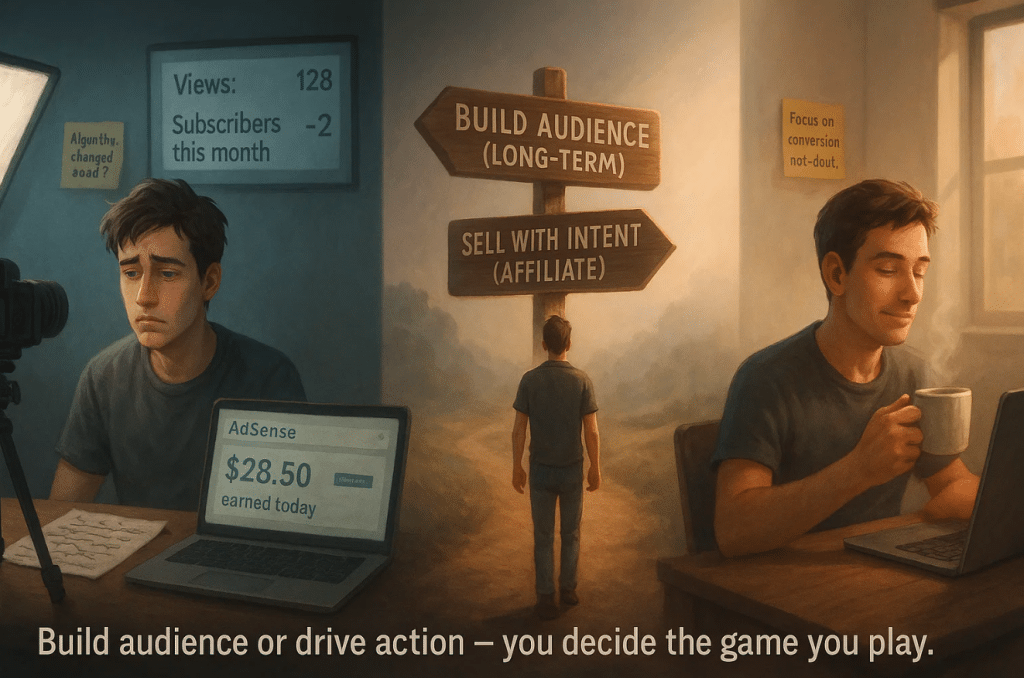
Advantages:
- You can build a long-term personal brand.
- A successful channel can generate multiple streams of income.
- It gives you influence and a voice within a community.
But in reality:
- It takes a long time to build consistent views or readership.
Competition is fierce—especially in popular niches. - Your income depends heavily on algorithms. One change from YouTube or Google can slash your revenue by 50% overnight.
- Many creators rely on luck—one viral video or top-ranking blog post can make or break them.
Affiliate marketing, on the other hand, is focused on buying behavior, not content visibility algorithms.You can run short-term campaigns that target high-converting keywords—without needing a big channel or blog to start earning.
Even better, you can combine affiliate marketing with blogging or YouTube to double your results—instead of relying solely on ad revenue.
Of course, that doesn’t mean affiliate marketing is easy or that everyone who tries will succeed.
But if we’re being fair, it’s one of the lowest-risk, lowest-cost online business models that doesn’t require inventory, customer service, or a team.
Put simply: Affiliate marketing isn’t easy—but it’s the easiest among the hard paths.
Why Do So Many People Fail at Affiliate Marketing?
Not everyone who tries affiliate marketing succeeds.
In fact, if you dig a little deeper, you’ll see that most people give up halfway through. But the reason for failure usually isn’t the business model—it’s the mindset.
And more specifically, it often comes down to these three things:
1. Dreaming Big, Quitting Fast: The Cost of the Get-Rich-Quick Mindset
One of the most common mistakes beginners make is believing affiliate marketing is some kind of shortcut to financial freedom.
They enter the space thinking:
“If I just learn a few tricks and follow a simple checklist, the money will start rolling in.”
The internet is flooded with videos of young people claiming to make $10K/month from their laptop, working from a beach, sipping coffee while watching sales pour in.
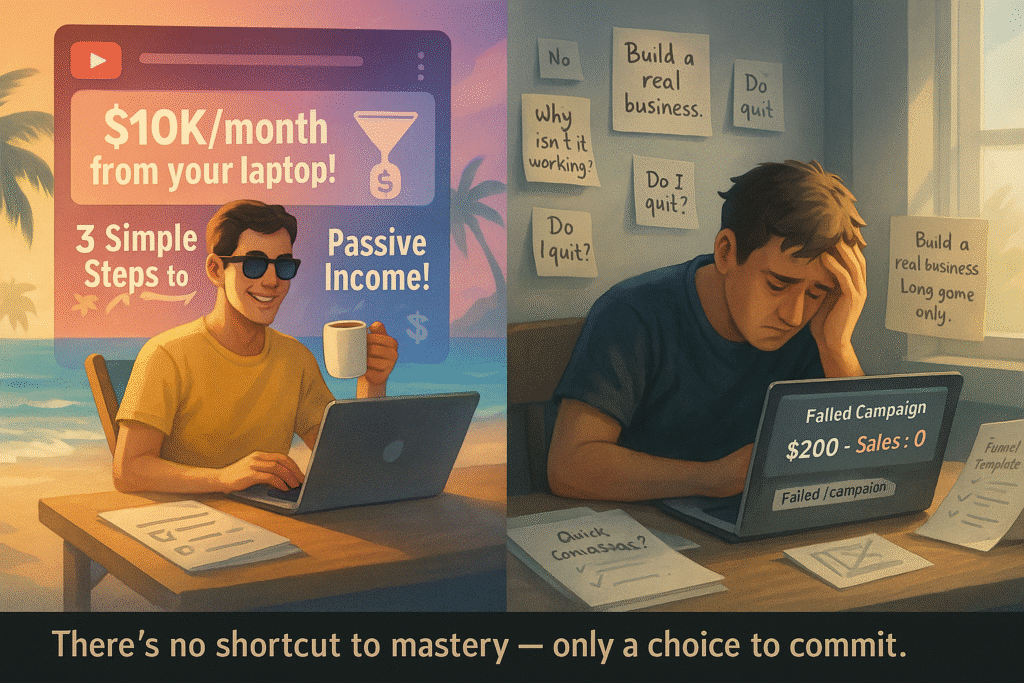
It creates the illusion that affiliate marketing is a “low-effort, high-reward” model—an escape from the grind of traditional jobs.
But once people actually get started, they’re in for a rude awakening.
After a few weeks of running ads with no sales, or writing blog posts that no one reads, discouragement sets in.
Many start to wonder: “I followed all the steps—why isn’t it working?”
What they don’t realize is that affiliate marketing is a long game.
It requires trial and error, ongoing analysis, and constant optimization—just like any real business.There are no hacks that will earn you thousands of dollars if you lack skill, don’t understand your audience, or aren’t willing to test, fail, and learn again.
There’s no “magic plugin” or “funnel template” that can save someone who isn’t willing to put in the work.
This craving for fast and easy success is what causes thousands of people to quit before they ever understand the true nature of affiliate marketing.
If you want to succeed, you need to build a strong foundation.
You need to treat this seriously—as if you’re launching a real startup.
Because that’s exactly what you’re doing.
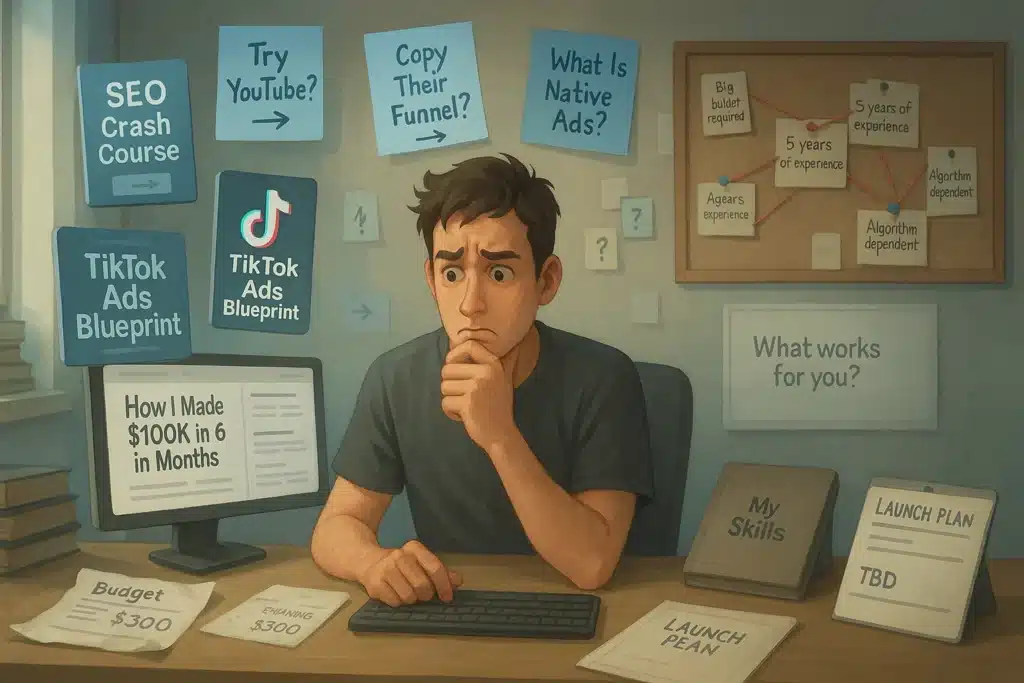
2. Overloaded with Info, Underprepared to Act
We live in an age where typing “how to do affiliate marketing” into Google or YouTube brings up thousands of results—tutorial videos, blog posts, free courses, downloadable ebooks…
There’s no shortage of information.
And yet, most beginners still fail.
Why?
Because people tend to share what worked for them, not necessarily what you should be doing.Someone teaches you to run ads—but their strategy assumes a $5,000/month ad budget.
You? You only have $300.
Someone explains how they make money blogging—but they write like a professional copywriter, have years of SEO experience, and have been doing it for 5 years.
You? You’ve just started writing, don’t know how to pick keywords, and haven’t learned how to optimize headlines yet.
That doesn’t mean you’re not good enough.
It simply means you’re comparing yourself to someone at a completely different stage, with a different foundation and set of resources.
If you blindly follow what others are doing—without asking whether it’s right for your situation—you’ll fall into the trap of imitation:
- They start a blog → so you start a blog.
- They go viral on TikTok → so you try TikTok.
- They run native ads → so you mimic their ad setup.
And before you know it, you’re jumping from one strategy to another.
You burn through your budget without understanding anything—and you burn out in the process.
Affiliate marketing isn’t about finding the one “perfect” method.
It’s about finding what works for you—your budget, your skills, your strengths, your lifestyle.And you can’t figure that out just by reading or watching tutorials.
You need to take action, make mistakes, and then analyze what’s working—and what’s not.
That’s how real learning happens: through experience and selective insight.
3. All Theory, No Action: When Learning Too Much Leaves You Broke
One of the most common mistakes beginners make in affiliate marketing is this: They spend all their money on learning—and have nothing left to actually build.
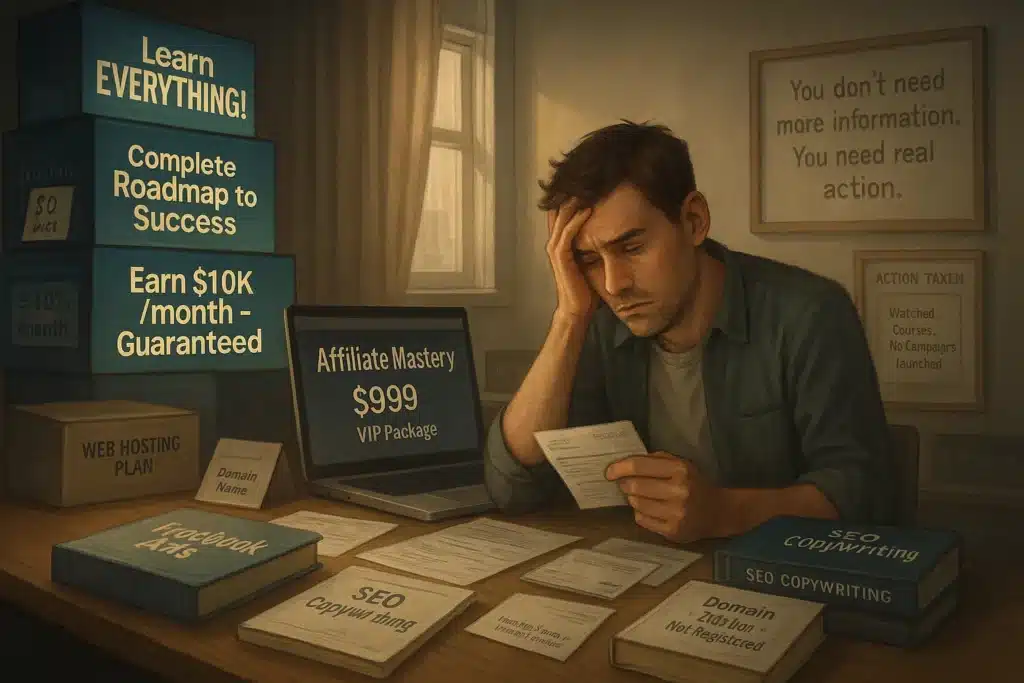
It often starts with a “VIP” course priced at $999, promising to help you earn $10K/month, just like it did for “thousands of others.”
After finishing that course, they’re still unsure where to begin—so they buy another.
- Then a course on running ads.
- Then one on SEO.
- Another on writing high-converting content.
And by the end… they’re completely broke.
Now they’ve got a head full of knowledge—But no budget to launch a serious affiliate campaign.
- No money to test ads.
- No funds for a domain, hosting, or optimization tools.
- No real-world experience—because all their time was spent studying, not doing.
And here’s the hard truth: Affiliate marketing isn’t something you can fully learn before doing.It’s something you only learn by doing.
Once you actually launch a campaign, you’ll start to understand:
- What’s wrong with your landing page.
- Whether your ad headline is getting decent CTR.
- Why people are ignoring your affiliate link.
Each failed test becomes a powerful lesson— And that’s the kind of learning no course can give you.
So if you’re starting with a small budget, don’t spend it all on expensive courses.
Learn just enough from free blogs and YouTube to get started— Then invest your time and money in taking real action.
You’ll fail at first. That’s normal.
But those failures will teach you far more than any classroom ever could.
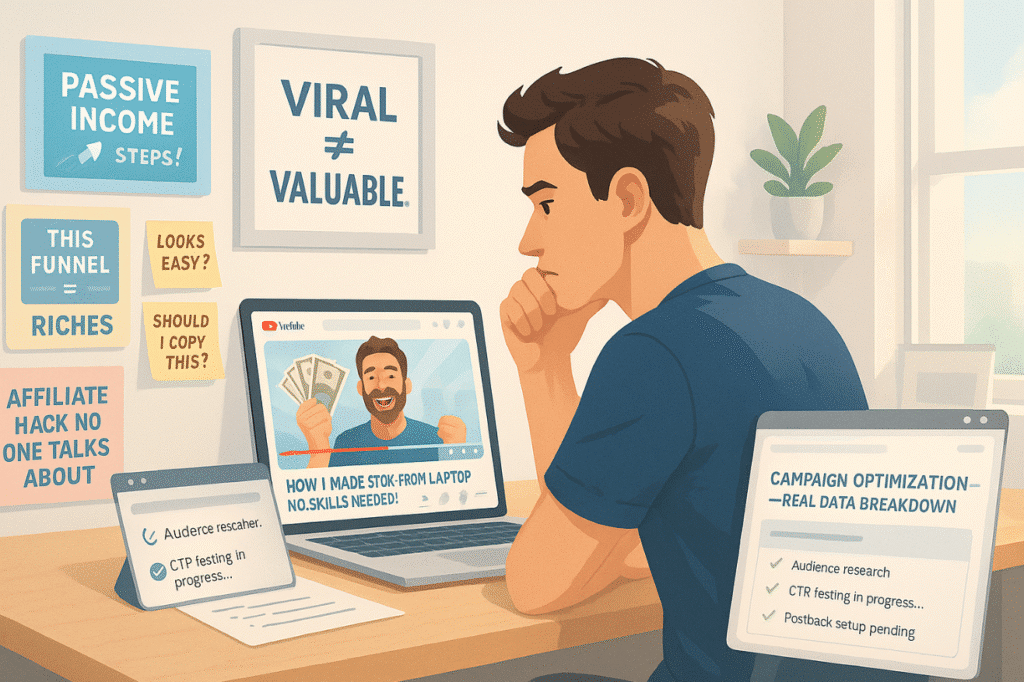
4. When Viral Videos Mislead—and the Real Lessons Are Hidden
Another common reason people fail at affiliate marketing is because they learn from clickbait content.
More specifically:
They rely on YouTube videos with hundreds of thousands of views—featuring flashy titles, eye-catching thumbnails, and charismatic speakers.These videos are usually simple, inspiring, and make affiliate marketing seem like a breeze.
You walk away thinking, “This looks easy—I can totally do this!”
But here’s the problem:
To get views, content must be oversimplified.
It needs to sound easy, relatable, and emotionally appealing to the masses.
Meanwhile, the real, in-depth knowledge—the stuff that comes from actual experience—often gets ignored, has fewer views, or is kept behind closed doors.
So what about the people who are truly successful in affiliate marketing?
Most of them don’t share much—because they’re busy making money.
And if they do share, it’s usually through advanced-level content, with low view counts, or through private communities and livestreams.- They don’t rely on YouTube ad revenue.
- They earn from well-built affiliate systems—real campaigns, not tutorials.
In contrast, many so-called “affiliate marketing gurus” on YouTube make their income from video views, not from affiliate commissions.
In other words:
- They don’t need you to succeed.
- They just need you to keep watching.
And if you fail? That’s fine. You’ll come back for the next video.
The result: Newcomers get the wrong impression.
They think they’re learning how to succeed in affiliate marketing— But in reality, they’re just consuming entertainment disguised as education.
5. Giving Up When Hitting the “Skill Wall”
At first glance, affiliate marketing seems simple: pick a product, grab an affiliate link, run some ads, or write a review post.
But the deeper you go, the more you realize:
To actually make money, you’ll have to overcome a series of skill walls—barriers no one warns you about in the beginning.
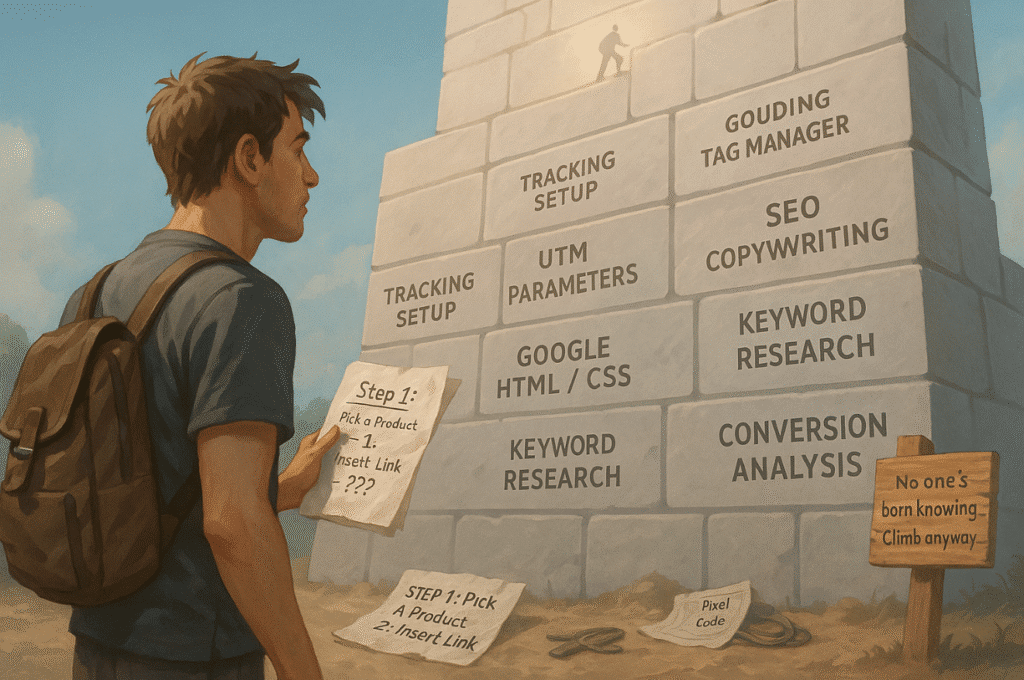
If you choose paid ads:
You’ll need to learn how to set up tracking, install pixels, use UTM parameters, and measure conversions.
You’ll need to optimize landing pages, use tools like Google Tag Manager, and understand basic funnel design.
Sometimes, you’ll even have to dive into HTML, CSS, or JavaScript to fix small bugs—because if you don’t, your site may not display properly.
If you go the SEO route—building a blog for long-term affiliate income:
You’ll need to spend hundreds of hours improving your writing, learning keyword research, organizing content logically, and creating posts that are not only SEO-friendly but also genuinely engaging for readers.
And here’s the kicker: AI can’t do this for you.
AI-generated content will never outperform a real, in-depth blog with authority—especially in Google’s eyes.
This is the point where many people start feeling discouraged.
They thought affiliate marketing was just “insert a link, make money.”
But now they’re realizing: to earn anything, they’ll need to learn real skills—and real skills aren’t learned overnight.
This is where many give up.
They start thinking, “Maybe I’m just not good enough.”
But here’s the truth: No one’s good enough in the beginning.
No one is born knowing how to do affiliate marketing.
Even the top affiliates you admire once struggled.
They were once beginners—pulling their hair out over broken tracking, blog posts stuck on page 10 of Google, and conversion rates stuck at 0%.
But they didn’t quit. They pushed through—and that made all the difference.
The Loneliness of Doing Affiliate Marketing Alone
One thing people rarely talk about in affiliate marketing is this: it can be incredibly lonely.
- You don’t have a boss.
- You don’t have coworkers.
- And there’s no one standing over your shoulder showing you what to do next.
When your campaigns aren’t converting…
When your ad budget is disappearing without results…
There’s no one to turn to for answers.
You have to analyze everything yourself. Adjust everything yourself. And sometimes, all you can do is stare at the screen—and sigh.

There’s no applause when you do well.
No encouragement when you feel like quitting.
Just you—and the decisions you alone are responsible for.
That’s why, to go the distance, you need more than just skills. You need mental strength.
You need to believe in the path you’ve chosen—even when you have no proof it’s working yet.
You need to keep going—even when no one understands you, supports you, or cheers you on.
Affiliate marketing is a solitary journey. But perhaps that’s exactly why—it’s also a journey of growth.
The Biggest Advantage of Affiliate Marketing: Freedom
Despite its challenges—despite the competition, the steep learning curve, and the need for constant persistence—affiliate marketing continues to attract people for one powerful reason: Freedom.
When you do affiliate marketing, you don’t need to clock in at 8 a.m.
- You don’t have a boss breathing down your neck.
- You don’t sit through endless meetings or deal with office politics.
- You don’t have meaningless KPIs or need to ask permission just to take a few days off and visit home.
You can work from anywhere—a quiet café, a small cottage in the countryside, or a creative space deep in the mountains.
- You can spend more time with your parents, your children, or yourself.
- You can read, meditate, build things, or learn something new—things you never had time for in a traditional 9-to-5 job.
It’s a kind of freedom most conventional jobs can’t offer—no matter how high the salary.
The Hardest Lesson: Knowing When Enough Is Enough
Here’s the paradox of affiliate marketing: Some people succeed. They escape the 9-to-5 grind. They earn enough to live comfortably.
But then—they want more.
They launch more campaigns. They optimize more funnels. They build more websites. They expand to TikTok, YouTube, and beyond.
They end up working day and night—harder than they did when they had a job.
And just like that, the freedom they once gained… quietly slips away.
They trap themselves in an endless cycle, all because of one thing: greed.
There are people making $5,000 a month through affiliate marketing who still feel poor. They want $10K, then $20K, then $100K.
And in the end, they spend their entire lives under pressure— Even though they once had freedom in their hands.That’s why you need to learn the art of stopping.
Remember why you started this journey.
If your goal was freedom, don’t let yourself be the one to take it away.
Final Thoughts…
There’s no such thing as getting rich without sacrifice. Affiliate marketing is no exception.
- It’s not for the impatient.
- It’s not for those who want overnight success.
And it’s definitely not for those who only consume content—but never take action.
But if you approach it with the right mindset—treating it like a real business, and learning through real experience—
Affiliate marketing can give you something that few careers ever will: True freedom.
You don’t have to be great from day one.
You just have to not quit.
Because sometimes, the people who win aren’t the smartest—
They’re the ones who show up, who learn, and who know exactly what they’re living for.











